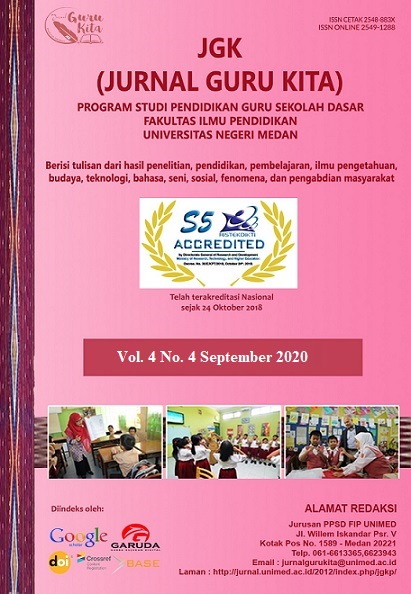PENGAMBILAN KEPUTUSAN DAN PENINGKATAN MUTU PENDIDIKAN DI SMK NEGERI 2 BINJAI
DOI:
https://doi.org/10.24114/jgk.v6i2.31650Abstract
Abstract Decision Making and Education Quality Improvement in State Vocational High School 2 Binjai. Educational decision-making related to all potentials optimally starting from education staff, students, learning processes, educational facilities, finances, and including their relationship with the community is the right step to improve the quality of education. It is said to be appropriate because all of the above potentials are several aspects that must be managed properly in educational institutions. So in this case, SMK Negeri 2 Binjai as one of the leading schools in the city of Binjai in every policy carried out cannot be separated from decision making involving teachers and representatives in madrasas. This means that the principal does not make the decision himself. Except in cases that are predicted to have the consensus and are urgent, the head of the madrasa makes decisions without involving his subordinates. Keywords: Decision Making, Quality of Education Abstrak Pengambilan Keputusan Dan Peningkatan Mutu Pendidikan Di Smk Negeri 2 Binjai. Pengambilan keputusan pendidikan yang berhubungan dengan seluruh potensi secara optimal mulai dari tenaga kependidikan, peserta didik, proses pembelajaran, sarana pendidikan, keuangan dan termasuk hubungannya dengan masyarakat merupakan langkah yang tepat dalam usaha meningkatkan mutu pendidikan. Dikatakan tepat karena seluruh potensi di atas merupakan beberapa aspek yang harus dikelola dengan baik dalam lembaga pendidikan. Jadi dalam hal ini, SMK Negeri 2 Binjai sebagai salah satu sekolah unggulan kota Binjai dalam setiap kebijakan yang dilakukan tidak terlepas dari pengambilan keputusan yang melibatkan guru dan wakil di madrasah. Maksudnya adalah kepala sekolah tidak mengambila sendiri keputusan tersebut. Kecuali dalam hal yang diprediksi memiliki kemufakatan dan sifatnya mendesak maka kepala madrasah melakukan pengambilan keputusan tanpa melibatkan bawahannya. Kata Kunci: Pengambilan Keputusan, Mutu PendidikanReferences
Chaniago, Nasrul Cakur. 2011. Manajemen Organisasi, Bandung: Citapustaka Media Perintis.
Danim, Sudarwan. 2007. Visi Baru Manajemen Sekolah, Jakarta: Bumi Aksara.
Dermawan, Rizky. 2006. Pengambilan Keputusan, Bandung: Alfabeta.
Desmita. 2008. Psikologi Perkembangan, Bandung: Remaja Rosdakarya.
Depdiknas. 2000. Manajemen Peningkatan Mutu Berbasis Sekolah, Jakarta: Direktorat Pendidikan Menengah Umum.
Frances Hesselbein, et.al.(Eds.). 2001. Organisasi Masa Depan. Terj. Achmad Kemal, Cet. 2 Jakarta: Elex Media Komputindo.
Faisal, Sanapiah. 1990. Penelitian Kualitatif Dasar-dasar dan aplikasi, Malang: YA3.
Joremo, Arcaro,S. 2005. Pendidikan Berbasis Mutu, Prinsip-Prinsip Perumusan dan Tata Langkah Penerapan, Jakarta: Rineka Cipta.
Lexy J Moleong. 2001. Metode Penelitian Kualitatif, Bandung: Remaja Rosdakarya.
. 2005. Metodologi, John W, Creswell, Educational Research, Planning, Conduction and Evaluating Quantitative dan Qualitative Research. International Edition. By Pearson Education, Inc, Upper Saddle River, New Jersey 07458.
Nazir, Moh. 2013. Metode Penelitian, Jakarta: Ghalia Indoneia.
Poewadarminta. W.J.S.. 2003. Kamus Umum Bahasa Indonesia, Jakarta: Balai Pustaka.
Poerbakawatja, Soeganda, 2010. Ensiklopedi Pendidikan Cet.IX , Jakarta: Gunung Agung.
Syafaruddin. 2005. Manajemen Lembaga Pendidikan Islam, Jakarta: Ciputat Press.
Suderadjat, Hari. 2005. Manajemen Peningkatan Mutu Berbasis Sekolah; Peningkatan Mutu Pendidikan Melalui Implementasi KBK, Bandung: Cipta Lekas Garafika
Taylor, Harold L.1998. Delegasi Kunci Sukses Praktek Manajemen, Terj. Roh Mulyadi Hamzah, Jakarta: Pustaka Binaman Pressindo.
Usman, Husaini. 2006. Manajemen, Teori, Praktik, dan Riset Pendidikan, Jakarta: Bumi Aksara.
Downloads
Published
How to Cite
Issue
Section
License
Authors published with the JGK (Jurnal Guru Kita) agree to the following terms:
- Authors retain copyright and grant the journal the right of first publication with the work simultaneously licensed under a Creative Commons Attribution License (CC BY-SA 4.0) that allows others to share the work with an acknowledgment of the work's authorship and initial publication in this journal.
- Authors are able to enter into separate, additional contractual arrangements for the non-exclusive distribution of the journal's published version of the work (e.g., post it to an institutional repository or publish it in a book), with an acknowledgment of its initial publication in this journal.
- Authors are permitted and encouraged to post their work online (e.g., in institutional repositories or on their website) prior to and during the submission process, as it can lead to productive exchanges, as well as earlier and greater citation of published work. (See The Effect of Open Access)




























